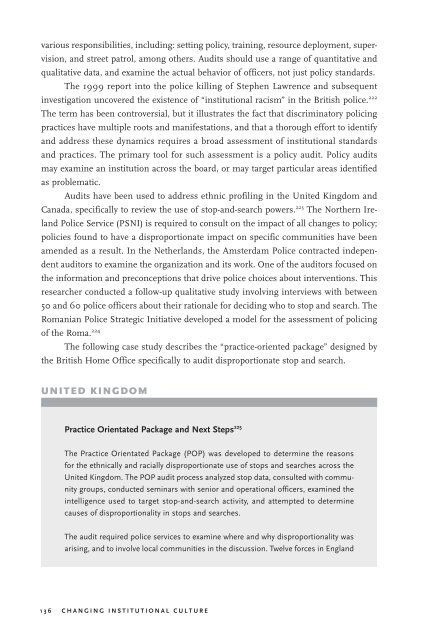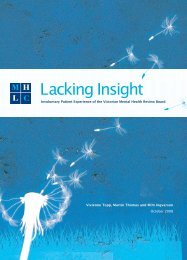Reducing Ethnic Profiling in the European Union - Open Society ...
Reducing Ethnic Profiling in the European Union - Open Society ...
Reducing Ethnic Profiling in the European Union - Open Society ...
- No tags were found...
Create successful ePaper yourself
Turn your PDF publications into a flip-book with our unique Google optimized e-Paper software.
various responsibilities, <strong>in</strong>clud<strong>in</strong>g: sett<strong>in</strong>g policy, tra<strong>in</strong><strong>in</strong>g, resource deployment, supervision,and street patrol, among o<strong>the</strong>rs. Audits should use a range of quantitative andqualitative data, and exam<strong>in</strong>e <strong>the</strong> actual behavior of officers, not just policy standards.The 1999 report <strong>in</strong>to <strong>the</strong> police kill<strong>in</strong>g of Stephen Lawrence and subsequent<strong>in</strong>vestigation uncovered <strong>the</strong> existence of “<strong>in</strong>stitutional racism” <strong>in</strong> <strong>the</strong> British police. 222The term has been controversial, but it illustrates <strong>the</strong> fact that discrim<strong>in</strong>atory polic<strong>in</strong>gpractices have multiple roots and manifestations, and that a thorough effort to identifyand address <strong>the</strong>se dynamics requires a broad assessment of <strong>in</strong>stitutional standardsand practices. The primary tool for such assessment is a policy audit. Policy auditsmay exam<strong>in</strong>e an <strong>in</strong>stitution across <strong>the</strong> board, or may target particular areas identifiedas problematic.Audits have been used to address ethnic profil<strong>in</strong>g <strong>in</strong> <strong>the</strong> United K<strong>in</strong>gdom andCanada, specifically to review <strong>the</strong> use of stop-and-search powers. 223 The Nor<strong>the</strong>rn IrelandPolice Service (PSNI) is required to consult on <strong>the</strong> impact of all changes to policy;policies found to have a disproportionate impact on specific communities have beenamended as a result. In <strong>the</strong> Ne<strong>the</strong>rlands, <strong>the</strong> Amsterdam Police contracted <strong>in</strong>dependentauditors to exam<strong>in</strong>e <strong>the</strong> organization and its work. One of <strong>the</strong> auditors focused on<strong>the</strong> <strong>in</strong>formation and preconceptions that drive police choices about <strong>in</strong>terventions. Thisresearcher conducted a follow-up qualitative study <strong>in</strong>volv<strong>in</strong>g <strong>in</strong>terviews with between50 and 60 police officers about <strong>the</strong>ir rationale for decid<strong>in</strong>g who to stop and search. TheRomanian Police Strategic Initiative developed a model for <strong>the</strong> assessment of polic<strong>in</strong>gof <strong>the</strong> Roma. 224The follow<strong>in</strong>g case study describes <strong>the</strong> “practice-oriented package” designed by<strong>the</strong> British Home Office specifically to audit disproportionate stop and search.UNITED KINGDOMPractice Orientated Package and Next Steps 225The Practice Orientated Package (POP) was developed to determ<strong>in</strong>e <strong>the</strong> reasonsfor <strong>the</strong> ethnically and racially disproportionate use of stops and searches across <strong>the</strong>United K<strong>in</strong>gdom. The POP audit process analyzed stop data, consulted with communitygroups, conducted sem<strong>in</strong>ars with senior and operational officers, exam<strong>in</strong>ed <strong>the</strong><strong>in</strong>telligence used to target stop-and-search activity, and attempted to determ<strong>in</strong>ecauses of disproportionality <strong>in</strong> stops and searches.The audit required police services to exam<strong>in</strong>e where and why disproportionality wasaris<strong>in</strong>g, and to <strong>in</strong>volve local communities <strong>in</strong> <strong>the</strong> discussion. Twelve forces <strong>in</strong> England136 CHANGING INSTITUTIONAL CULTURE
















